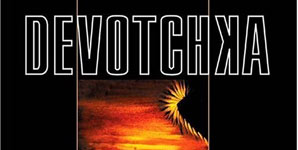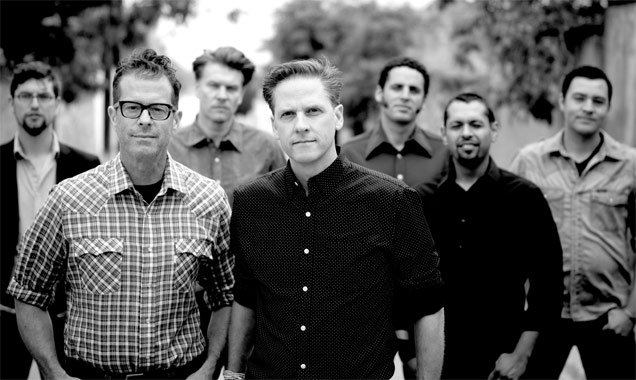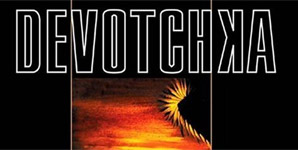DeVotchKa
How It Ends
Album Review

I have to confess, I was a bit wary of this record. The brief notes that accompanied it promised 'a disparate, yet articulate union of Romani, Greek, Slavic, Bolero, Tango and Mariachi with American punk and folk roots'. I was fearing the musical equivalent of one of those 'snazzy' hand-knitted jumpers that one used to receive from a kindly yet slightly unhinged aunt at Christmas: while one could admire it as a feat of wool-based engineering, the chances of one actually wearing the bloody thing were slim at best.
But I've got to admit, I was pleasantly surprised. For once, the brief notes did not lie. I'd even go so far as to replace 'articulate' with 'cohesive', because somehow, out of all those influences, DeVotchKa have managed to make a record that hangs together rather well. Opener 'You Love Me' begins in straight enough fashion, a strummed acoustic guitar and a voice that has hints of Thom Yorke. There's a widescreen violin or two in the chorus, which is nicely at odds with the overall campfire-with-reverb feeling. In stark contrast, 'The Enemy Guns' begins in punky manner before taking a turn for the spaghetti Western, with some mean whistling. The vocals and violin sound pleasingly Romany, and there's some absolutely fabulous percussion as well. A brief accordion break provides another diversion before we're back to the whistling - and then the percussion again. And so it goes on. These are essentially simple songs, but the instrumentation is refreshingly different and the playing is tight without being overbearing. The almost martial ending's fun, too.
'No One Is Watching' suggests that really, someone is: it's rather creepy, and very brief. And then 'Twenty-Six Temptations' begins with some syncopated percussion, with a tuba parping away underneath it. A piano roughly triangulated by Maigret and Jeeves and Wooster joins in and a violin supplies a bit of texture to the evocative vocals. The percussion and the tuba threaten to steal this track, especially in the chorus, when the latter plumbs depths that we don't usually hear on 'pop' records. And somehow, even the cymbal manages to sound a bit sinister. 'How It Ends' begins with something that might be a tremelo-ed keyboard - it sounds claustropohobic until an accordion joins in, and then a piano figure appears, softening the sound quite beautifully. The vocal on this one has hints of Roy Orbison crossed with Johnny Cash but really sounds like neither. The verses are very sparse, pretty much just the keyboard and the voice, but when the drums come in with the piano and the violin, it's not a million miles away from Michael Nyman's softer, more romantic moments. It's really rather pretty.
'Charlotte Mittnacht' begins with an accordion, playing the kind of quasi-oompah rhythms that I, for one, almost expect from an accordion that originates in Eastern Europe. The track's fleshed out by violins and a glockenspiel, and eventually some rather martial percussion. So martial, in fact, that I swear it turns into a machine gun at one point. The promised mariachi appears on 'We're Leaving', all chirpy trumpets and strummed acoustic guitar, with a melody and vocal delivery that sound decidedly Latin. 'Dearly Departed' sets piano against acoustic guitar and a soaring, emoting vocal. Perhaps the latter goes a little too far in the histrionics department, but in the context of the rest of the record and given the subject matter, it sounds fine. 'Such A Lovely Thing' picks the tempo up to a kind of woozy stomp. Again, the percussion's great, driving the track along until it speeds up into a flurry of violins. And then we revert back to the beginning, before speeding up again. It's an oddly intoxicating effect, and the violin and trumpet parts towards the end are a nice touch, too.'Too Tired' feels very whimsical - almost clockwork glockenspiel and plucked strings, with the return of the Roy Orbison-type vocal. It's the nearest thing so far to filler. 'Viens Avec Moi' begins with a weird bass throb and odd shards of sound before breaking into an accordion riff backed by bass and a subdued, almost whispered vocal. A guitar joins in - weirdly, I can imagine The Young Gods doing a belting version of this. It's got that slightly sinister, mesmerising edge that some of their quieter songs have. And it ends with the sound of a run-out groove. 'This Place Is Haunted' begins with a reverbed guitar arpeggio that's ... well ... haunting, vocal harmonies that are delicate, and a reverbed piano that's plaintive. Slightly alarmingly, a child giggles in the distance. Very unnerving.'Lunnaya Pogonka' begins with a certain menace - a strict bassline and some odd instrumental noises chattering away in the background. I'm waiting for it to kick off. And lo! Gradually it speeds up, the violins start to chatter and pirouette. And then we're off, a dizzying ride that's all too brief before we're back to bass and drums again. And then the percussion kicks in. You know those old fifties movies where the raven-haired Romany temptress dances round the camp fire? That's pretty much where we're at here. 'Reprise' is absolutely gorgeous - a lovely, hazy way to end a record. Again, I'm reminded of Michael Nyman's occasional pastoral whimsies - 'Cornfield' from the soundtrack to 'Prospero's Books' approximates the atmosphere. Similarly instrumental, it's got the same lazy, arching, aching, melancholy sprawl to it. For me, it could go on a good deal longer.This, I think, is another one of those records that people will like or dislike on the strength of the vocals. I think they work: you've got to give a band their context and see what they do with it, I reckon. The acid test is whether this record would work as well if someone else sang it. I'm not sure it would, but others might disagree. Another thing that might work against it for some is its length: fourteen tracks is a lot to ask of the listener in some cases, particularly with so much going on. Overall, though, it's pretty good stuff. Give it a go.
Jon Watson
3.5/5




